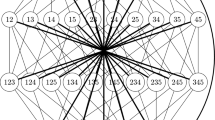Abstract
A novel theoretical formulation of Categorical Logic based on two properties of categorical propositions and three simple axioms has been introduced recently. This formulation allowed for the suppression of the distinction between immediate and mediate inferences, and also provided a theoretical framework to study opposition relations, thus restoring the theoretical unity of traditional Aristotelian logic. By using this approach, it has been reported that a total of 3072 conclusive syllogistic moods can be found when including indefinite terms in classical syllogistic, but this result has yet to be proven. This paper presents an overview of the recently proposed theoretical formulation of Categorical Logic, along with the derivation of the 48 canonical syllogistic moods that are capable of generating the 3072 conclusive moods previously reported.
Similar content being viewed by others
References
Correia M.: The Syllogistic Theory of Boethius. Anc. Philos. 29, 391–405 (2009)
Alvarez E., Correia M.: Syllogistic with Indefinite Terms. History Philos. Logic 33, 297–306 (2012)
Correia, M.: La lógica de Aristóteles. Ediciones Universidad Católica de Chile, Santiago de Chile (2003)
Béziau, J.-Y., Gerogiorgakis, S. (eds): New Dimensions of the Square of Opposition. Philosophia Verlag, Munich (2016)
Ross W.D.: Aristotle’s Prior and Posterior Analytics. Clarendom Press, Oxford (1949)
Wallis, J.: Institutio logicae. Oxford (1687)
The Logic Museum (2016). http://www.logicmuseum.com/wiki/Syllogism. Accessed on September 2016
Peterson, P.L.: Intermediate Quantifiers: Logic, Linguistics, and Aristotelian Semantics. Ashgate, Aldershot (2000)
Murinová P., Novák V.: A formal theory of generalized intermediate syllogisms. Fuzzy Sets Syst. 186, 47–80 (2012)
Murinová P., Novák V.: The structure of generalized intermediate syllogisms. Fuzzy Sets Syst. 247, 18–37 (2014)
Murinová P., Novák V.: Analysis of generalized square of opposition with intermediate quantifiers. Fuzzy Sets Syst. 242, 89–113 (2014)
Murinová P., Novák V.: Syllogisms and 5-Square of Opposition with Intermediate Quantifiers in Fuzzy Natural Logic. Logica Universalis 10, 339–357 (2016)
Peterson P.L.: On the logic of “Few”, “Many” and “Most”. Notre Dame J. Formal Logic 20, 155–179 (1979)
Author information
Authors and Affiliations
Corresponding author
Rights and permissions
About this article
Cite this article
Alvarez-Fontecilla, E. Canonical Syllogistic Moods in Traditional Aristotelian Logic. Log. Univers. 10, 517–531 (2016). https://doi.org/10.1007/s11787-016-0156-x
Received:
Accepted:
Published:
Issue Date:
DOI: https://doi.org/10.1007/s11787-016-0156-x




